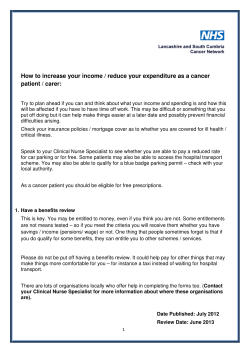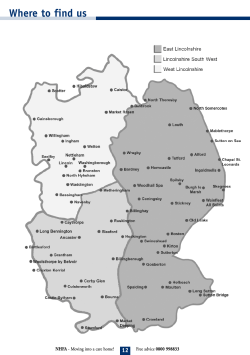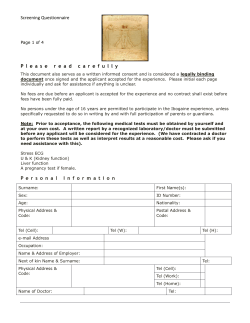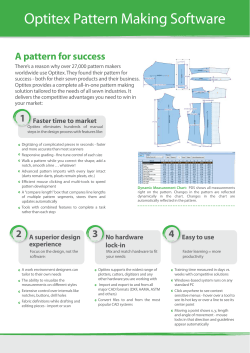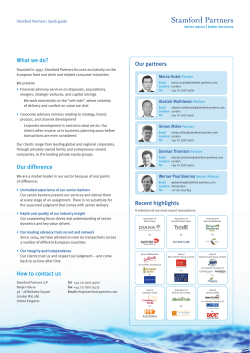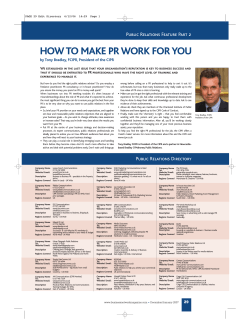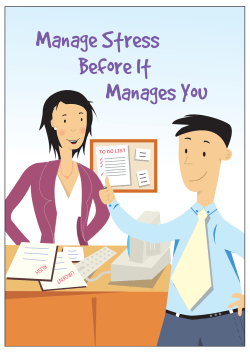
S O M E T H I N G ’... H O W T O H...
S O M E T H I N G ’ S N O T R I G H T. . . HOW TO HELP Advice for anyone who is experiencing an emotional crisis Introduction All of us have mental health, just as we all have physical health. There is a lot that you can do to stay mentally healthy – eating well, taking regular exercise, learning something new and having a good work-life balance can all help. However, we know that one in four of us will experience a mental health problem at some point in our lives. This booklet aims to be useful to people who are concerned about the mental health of someone they know, or about their own mental health. SAMH is Scotland’s leading mental health charity and is dedicated to mental health and wellbeing for all. www.samh.org.uk What is mental health? Mental health is defined by the World Health Organisation as: “A state of wellbeing in which the individual realises his or her own abilities, can cope with the normal stresses of life, can work productively and fruitfully and is able to make a contribution to his or her community.” What are mental health problems? Mental health problems can include anxiety, stress or panic attacks, and as with physical health, our mental health can be affected by life events or illness. There are many things that can have an impact on our mental health, such as the end of a relationship, bereavement, trauma, drugs or alcohol, childbirth or physical illness. Many people experience mental health problems but never receive a formal diagnosis. What kind of things might someone developing a mental health problem experience? Everyone’s experience of mental health problems is different, but this section lists some of the more common signs. Remember that experiencing one or more of the following does not necessarily mean that someone has a mental health problem: never make assumptions about someone else’s mental health. Withdrawing from other people, including friends, is a common sign that someone may be experiencing difficulties with their mental health. Other signs include: • feelings of hopelessness • intense sadness or despair • a lack of energy which makes everyday tasks like getting washed and dressed or going out seem too difficult • feelings of self-hatred • feeling guilty • insomnia. Less commonly, some people might hear or see things that are not apparent to other people. For example, someone may hear abusive voices or voices telling them to do unusual things (although many people hear voices but do not find it distressing). People might also have unlikely beliefs, for example that their food has been tampered with or that their phone has been tapped. Similarly someone might believe that external forces are trying to control their thoughts and actions. This list is not exhaustive. Any changes in someone’s usual behaviour may indicate a change in their mental health. How can you help? When someone close to you is starting to experience a mental health problem, it can often be difficult to know how to respond. Please remember that it is nobody’s ‘fault’ if someone develops a mental health problem. Talking and listening Encourage the person to talk about their feelings. Be patient and try not to be dismissive of the person’s experiences, no matter how difficult they may be for you to understand. Don’t be afraid to ask someone how they are feeling. If they find it difficult to talk about, be patient. There may also be times when the person doesn’t want to talk, and you should respect this. Sometimes people who are very distressed may say things that you find hurtful. Try not to take these personally - when people are in pain they often say things they don’t mean. Help and encouragement Someone who is experiencing mental health problems may find even small things very hard to do. Depression, in particular, can make the most minor tasks seem impossible. Try not to say things like, “Just pull yourself together” – you will only make the person feel worse. It might be helpful to encourage the person to do one or two activities each day, like going for a walk or doing a simple task like washing the dishes, and to be positive if they achieve them. You can also help by asking if the person would like you to help them with practical things, for example, paying a bill or completing a form. What to do in an emergency Ask the person how they are feeling. Try to remain calm and listen to what the person is saying. If the person is unable to seek help on their own behalf, call one of the contacts listed at the end of this leaflet. The first port of call would normally be the person’s GP or the social work department. Remember that you can only help temporarily and that ultimately, the person should be directed toward professional help. In urgent cases, that might mean going to Accident and Emergency at a hospital, or phoning the police. When someone goes to the GP or hospital doctor, they will be assessed. Following this they could be prescribed medication or another kind of support such as talking therapies; given a further appointment; be referred to a psychiatrist or admitted to hospital. In severe cases a person might be compulsorily admitted to hospital: also known as being “sectioned”. Can people recover? Who can help? People can and do recover from mental health problems. Recovery does not necessarily mean that life will go back to the way it was before, but it does mean that people can live a fulfilling life, regardless of the problems and difficulties they might be facing. 1. A GP A GP is usually the first person you will speak to. He/she can refer the person to other professionals like psychiatrists, psychologists and community psychiatric nurses. GPs can prescribe medication and can also make “social prescriptions”, such as exercise referral schemes. It is important to remember that everyone moves towards their recovery at their own pace, and that everyone’s journey to recovery is unique to them. It can take weeks, months or years. 2. Social Work Department The local Social Work Department has a team called the Community Mental Health Team. They are social workers and NHS workers with expertise in mental health. They can be called when access to a GP is difficult, such as out of hours or at weekends. The Community Mental Health Team will include a Mental Health Officer (MHO). The MHO is a specially trained social worker. You are important too! If you are reading this leaflet because you are concerned about someone else’s mental health, it is crucial that you look after your own needs too. There are organisations and agencies that offer information, support, respite and advice to people caring for someone with a mental health problem: see the useful contacts section at the end of this leaflet. 3. Self-help and Support Groups Self-help groups can provide support and also offer practical advice about facilities in the area. There are also groups for the carers and friends of people who are experiencing mental health problems. 4. Independent Advocacy Services Someone with a mental health problem may find it difficult to speak up for him or herself. An advocate can help the person to make their own decisions and, if necessary, speak up on their behalf. All mental health service users have a legal right to access independent advocacy. For details of advocacy services in your area, please contact SAMH’s Information Service. 5. Charities Charities can offer help by providing information and/or advice. They can also provide practical services for people, which might include housing support, supported accommodation, training or help with employment and benefits issues. They may also be able to provide information on local support groups and sources of support for carers or family members. Useful Contacts – key helplines Bipolar Scotland Helpline: 0800 917 3466 Email: info@samh.org.uk Web: www.samh.org.uk Studio 1015, Mile End Mill Abbeymill Business Centre, Seedhill Road, Paisley PA1 1TJ Tel: 0141 560 2050 Email: info@bipolarscotland.org.uk Web: www.bipolarscotland.org.uk Breathing Space Combat Stress (Mental Health for Veterans) National Mental Health Information Service (SAMH) Breathing Space is a free and confidential phone-line service for anyone who is experiencing low mood or depression or is in need of someone to talk to. Tel: 0800 83 85 87 Open every evening (6pm–2pm) and over the weekend Email: info@breathingspacescotland.co.uk Web: www.breathingspacescotland.co.uk Tyrwhitt House, Oaklawn Road, Leatherhead, Surrey KT22 0BX Tel: 0800 138 1619 Text: 07537 404719 Email: contactus@combatstress.org.uk Web: www.combatstress.org.uk Mental Welfare Commission for Scotland Action on Depression Mental Welfare Commission is an independent organization working to safeguard the rights and welfare of everyone with a mental illness, learning disability or other mental disorder. Thistle House, 91 Haymarket Terrace, Edinburgh, EH12 5HR Advice line: 0800 389 6809 Email: enquiries@mwcscot.org.uk Web: www.mwcscot.org.uk NHS 24 NHS 24 is the 24 hour-led NHS service providing health information and self-care advice. Tel: 08454 242424 Web: www.nhs24.com 11 Alva Street, Edinburgh, EH2 4PH Tel: 0808 802 2020 Web: www.dascot.org Support in Mind Scotland 6 Newington Business Centre, Dalkeith Road Mews, Edinburgh EH16 5GA Tel: 0131 662 4359 Email: info@supportinmindscotland.org.uk Web: www.supportinmindscotland.org.uk The National Self-Harm Network Useful Contacts – other organisations PO Box 7264, Nottingham, NG1 6WJ Tel: 0800 622 6000 Email: info@nshn.co.uk Web: www.nshn.co.uk See Me Scotland The Princess Royal Trust for Carers Scotland’s national campaign to end the stigma and discrimination of mental ill-health www.seemescotland.org.uk Scottish Recovery Network A network of individuals and organizations working to build awareness of mental health recovery. www.scottishrecovery.net Beat – the Eating Disorders Association Wensum House, 103 Prince of Wales Road, Norwich NR1 1DW Helpline: 0845 634 1414 Youthline: 0845 634 7650 Email: help@b-eat.co.uk Web: www.b-eat.co.uk Charles Oakley House, 125 West Regent Street, Glasgow G2 2SD Tel: 0141 221 5066 Email: infoscotland@carers.org Web: www.carers.org Scottish Independent Advocacy Alliance Melrose House, 69A George Street, Edinburgh, EH2 2JG Tel: 0131 260 5380 Email: enquiry@siaa.org.uk Web: www.siaa.org.uk Scottish Association for Mental Health. SAMH is a company limited by guarantee registered in Scotland No 82340. Scottish Charity No. SC-008897. Registered office: Brunswick House, 51 Wilson Street, Glasgow, G1 1UZ. We are often able to make our publications available in alternative formats. Please contact us for more details.
© Copyright 2025


